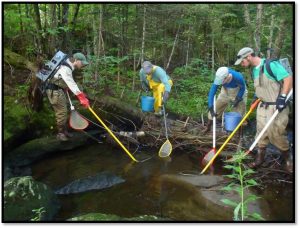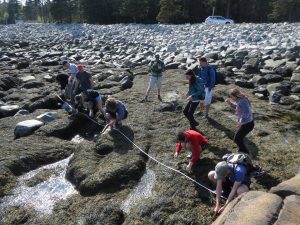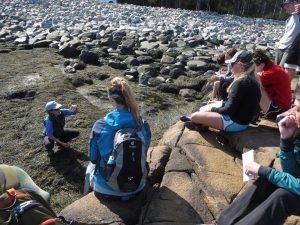32 Rachelle Lyons: Environmental Science
Nelson Arroyo
Introduction
John Martineau, Plymouth State University IDS Major
The following reading is an interview of Professor Rachelle Lyons conducted by Nelson Arroyo. In this interview, he talks to Professor Lyons about: how they met, how she got to where she is, what she researches, and how she is a interdisciplinarian (def. one who practices in an interdisciplinary field). When you are reading this post, think about if your program is critical or instrumental. What I mean by this is, does your program lean towards answering questions (abstract/critical) or solving problems (pragmatical/instrumental). As you read more about Professor Lyons, you should notice that her work leans more towards instrumental interdisciplinarity (def. the process of using two or more disciplines).
Interview with Professor Rachelle Lyons, Plymouth State University
Nelson Arroyo, Plymouth State University Student

When I was told to find a professor to get an interview with relating to my major and interdisciplinary studies, there was no doubt who I was going to choose. Professor Rachelle Lyons is a professor in the Environmental Science Department who not only showed me how much I didn’t think about when it comes to food systems, but also how much I love the topic of environmental science. My first-time meeting Professor Lyons was when I was late to her First-Year Seminar; the course was about food systems and how they work. Professor Lyons also teaches more advanced classes in the Environmental Science Department; classes include Issues in Sustainability, Intro to Environmental Science, and Field Studies for Scientists.
Professor Lyons did not start school studying environmental science, when she originally started school she started with a degree in Art Education, but she says while in college she grew an interest in Theology and World Religions. After both of those, she studied Earth Sciences; Professor Lyons says that “Earth Sciences brought together all my interests in people, art, and communications along with my passion for taking care of the landscape”.

Professor Lyons is currently doing research on food systems and freshwater resources. She said “a lot of people don’t make connections between food systems and stream stewardship”. She says a lot of her research connects because “food production, agriculture, is the number one user of freshwater resources and the number one polluter of fresh water”. She says a lot of her work is focused on the brook trout for two main reasons the first reason is that brook trout are significant to streams in NH, being an indigenous species. Brook trout are also a good indicator species, Professor Lyons says “if the brook trout are thriving that means the water quality is good, and the habitat is good and all the other species that are tied to the brook trout are also successful”.

Professor Lyons is a great example of how our interdisciplinary educations are important in the rapidly approaching future because she says her work is strongly embedded in an interdisciplinary work dynamic. Her work not only consists of the science of the environment, but also the importance of connecting the community to that science. She also works with numerous agencies to tackle subjects called “wicked problems.” Wicked problems are ones that have complex issues, but can’t be solved with simple answers. Professor Rachel Lyons is a perfect example of how interdisciplinary skills will benefit us in the future, whether we specialize in it or not. The ability for dynamic thinking will benefit us in more ways than can be anticipated.

